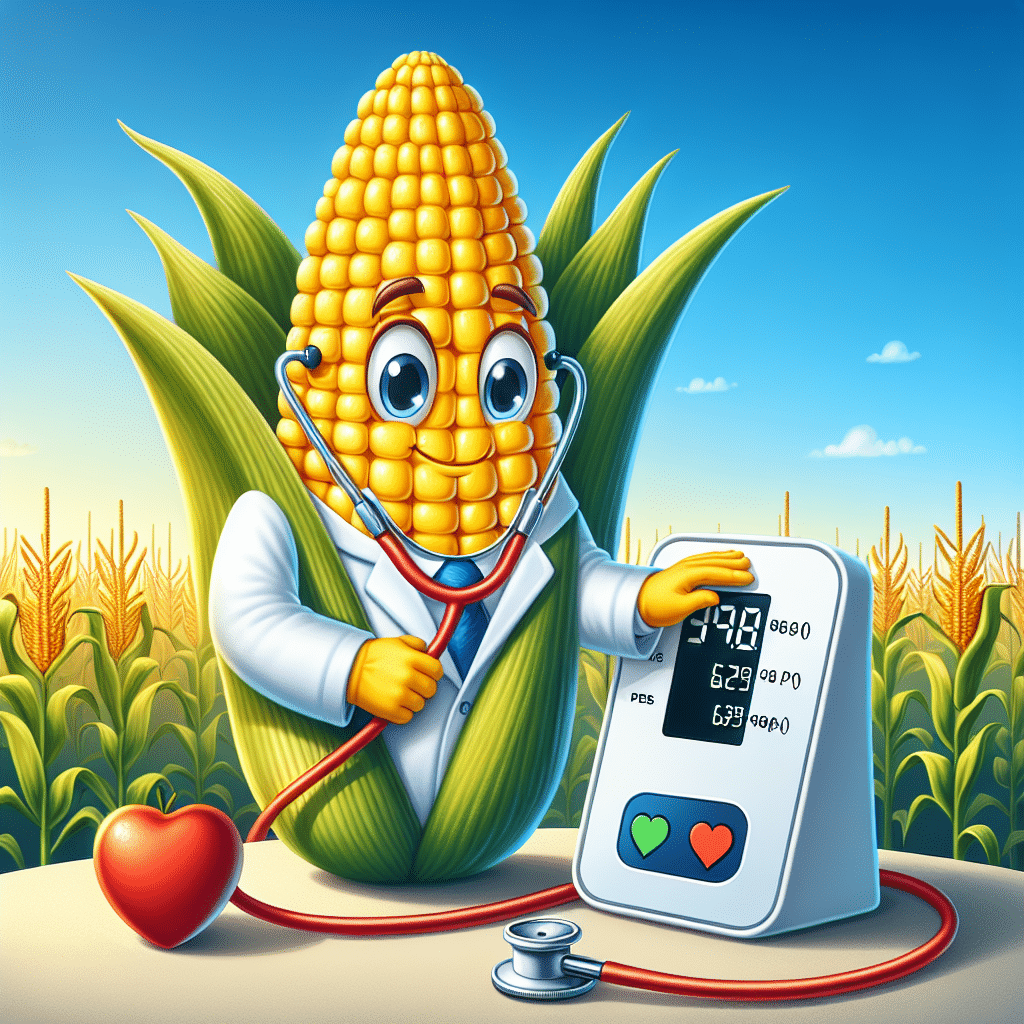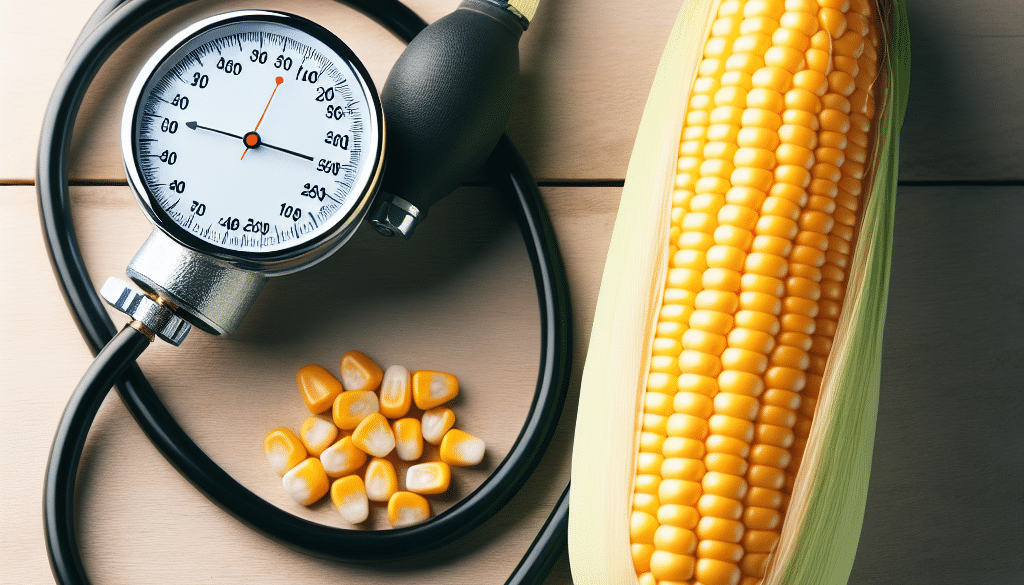Can Eating Corn Lower Blood Pressure?
-
Table of Contents
- Can Eating Corn Lower Blood Pressure? Insights and Health Benefits
- The Nutritional Profile of Corn
- Understanding Blood Pressure and Its Regulation
- Can Corn Influence Blood Pressure?
- Potassium Content
- Dietary Fiber
- Whole Grains and Heart Health
- Research on Corn and Blood Pressure
- How to Include Corn in a Blood Pressure-Friendly Diet
- Conclusion: Corn as Part of a Heart-Healthy Diet
- Discover ETprotein’s Protein Products
Can Eating Corn Lower Blood Pressure? Insights and Health Benefits

Hypertension, or high blood pressure, is a common health issue that affects millions of people worldwide. It’s a major risk factor for heart disease and stroke, leading causes of death globally. Diet plays a crucial role in managing blood pressure, and there’s growing interest in the potential benefits of whole grains, including corn. In this article, we’ll explore whether eating corn can help lower blood pressure and the science behind its health benefits.
The Nutritional Profile of Corn
Corn, also known as maize, is a staple food in many parts of the world. It’s not only a source of energy but also contains various nutrients that are essential for maintaining good health. Here’s a breakdown of what corn has to offer:
- Fiber: Corn is a good source of dietary fiber, which is beneficial for digestive health and can help manage blood pressure.
- Vitamins: It contains B vitamins, including thiamin (B1) and niacin (B3), which are important for energy metabolism and nervous system function.
- Minerals: Corn provides essential minerals like magnesium and potassium, which are key players in blood pressure regulation.
- Antioxidants: The yellow pigments in corn are due to compounds called carotenoids, which have antioxidant properties.
Understanding Blood Pressure and Its Regulation
Blood pressure is the force exerted by circulating blood on the walls of blood vessels. It’s determined by the amount of blood your heart pumps and the resistance to blood flow in your arteries. A healthy blood pressure level is vital for preventing damage to your heart and arteries, which can lead to heart disease and stroke.
The body regulates blood pressure through a complex system involving the heart, blood vessels, kidneys, and various hormones. Diet can influence this system, particularly through the intake of sodium, potassium, and other nutrients.
Can Corn Influence Blood Pressure?
Let’s delve into the potential effects of corn on blood pressure:
Potassium Content
Potassium is a mineral that plays a significant role in managing blood pressure. It helps to balance out the negative effects of sodium and eases tension in the blood vessel walls. Corn is a natural source of potassium, which may contribute to its potential blood pressure-lowering effects.
Dietary Fiber
Dietary fiber has been shown to have a positive impact on blood pressure. Fiber can improve cholesterol levels, help control blood sugar, and aid in weight management, all of which are factors in maintaining healthy blood pressure. Corn’s fiber content may thus be beneficial for those looking to manage their blood pressure.
Whole Grains and Heart Health
Whole grains, including whole corn, are an integral part of a heart-healthy diet. Studies have found that regular consumption of whole grains is associated with a lower risk of hypertension and cardiovascular disease. This is likely due to the combined effects of fiber, vitamins, minerals, and phytochemicals found in these foods.
Research on Corn and Blood Pressure
While there is no shortage of studies on whole grains and blood pressure, research specifically focusing on corn is less abundant. However, some studies suggest that corn’s nutrient profile can contribute to a reduction in blood pressure. For instance:
- A study published in the “Journal of the American Dietetic Association” found that a diet high in whole grains, including corn, was associated with lower systolic blood pressure.
- Another study in the “American Journal of Clinical Nutrition” reported that increased potassium intake, which can be obtained from corn, was linked to significant reductions in both systolic and diastolic blood pressure.
It’s important to note that these studies often look at dietary patterns as a whole rather than the effects of individual foods. Therefore, while corn may contribute to a healthy diet that supports blood pressure management, it should be part of a balanced and varied diet.
How to Include Corn in a Blood Pressure-Friendly Diet
Incorporating corn into your diet can be both delicious and beneficial for your health. Here are some tips for adding corn to a blood pressure-friendly diet:
- Choose whole corn or whole-grain corn products over refined ones to maximize the health benefits.
- Limit the addition of high-sodium toppings like butter and salt. Instead, use herbs and spices for flavor.
- Include corn as part of a diet rich in fruits, vegetables, lean proteins, and other whole grains.
- Be mindful of portion sizes and the overall balance of your meals.
Conclusion: Corn as Part of a Heart-Healthy Diet
In conclusion, while corn alone is not a magic solution for high blood pressure, it can be part of a dietary approach to help manage it. The key is to consume corn as part of a balanced diet that includes a variety of nutrient-rich foods. By doing so, you can enjoy the potential health benefits of corn, including its possible role in lowering blood pressure.
Discover ETprotein’s Protein Products
If you’re looking to enhance your diet with high-quality protein sources, consider ETprotein’s range of organic bulk vegan proteins. Their products, including rice protein, pea protein, and various seed proteins, are non-GMO, allergen-free, and boast a neutral taste. These proteins can be a valuable addition to a heart-healthy diet, especially for those managing blood pressure.
About ETprotein:
ETprotein, a reputable protein and L-(+)-Ergothioneine (EGT) Chinese factory manufacturer and supplier, is renowned for producing, stocking, exporting, and delivering the highest quality organic bulk vegan proteins and L-(+)-Ergothioneine. They include Organic rice protein, clear rice protein, pea protein, clear pea protein, watermelon seed protein, pumpkin seed protein, sunflower seed protein, mung bean protein, peanut protein, and L-(+)-Ergothioneine EGT Pharmaceutical grade, L-(+)-Ergothioneine EGT food grade, L-(+)-Ergothioneine EGT cosmetic grade, L-(+)-Ergothioneine EGT reference grade and L-(+)-Ergothioneine EGT standard. Their offerings, characterized by a neutral taste, non-GMO, allergen-free attributes, with L-(+)-Ergothioneine purity over 98%, 99%, cater to a diverse range of industries. They serve nutraceutical, pharmaceutical, cosmeceutical, veterinary, as well as food and beverage finished product distributors, traders, and manufacturers across Europe, USA, Canada, Australia, Thailand, Japan, Korea, Brazil, and Chile, among others.
ETprotein specialization includes exporting and delivering tailor-made protein powder and finished nutritional supplements. Their extensive product range covers sectors like Food and Beverage, Sports Nutrition, Weight Management, Dietary Supplements, Health and Wellness Products, and Infant Formula, ensuring comprehensive solutions to meet all your protein needs.
As a trusted company by leading global food and beverage brands and Fortune 500 companies, ETprotein reinforces China’s reputation in the global arena. For more information or to sample their products, please contact them and email sales(at)ETprotein.com today.












